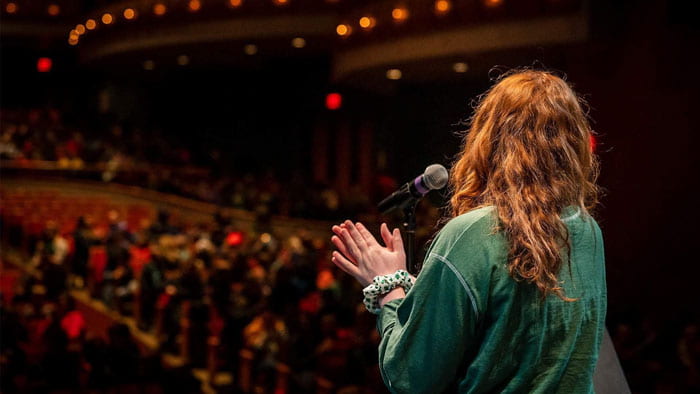Gifts to support the Weidner at the University of Wisconsin Green Bay creates not only a legacy, but an investment in the future.
A planned gift to The Weidner will leave a legacy for theater goers, present and future.
What is Planned Giving?
Planned giving involves providing for a future gift to charities through your financial and estate plans. The Weidner welcomes gifts made through different planned giving arrangements. These arrangements can:
- Provide for you or your loved ones
- Entitle you to charitable income and/or gift estate tax deductions
- Enable you to leave a legacy for The Weidner
A charitable gift through your will or trust can dramatically reduce federal estate and inheritance taxes, while providing support for students and programs. The Milwaukee BizTimes recently published a great article on planned giving HERE!
Misconception: Planned Gifts are too Complicated
“The opposite is true, according to [Karen] Ellenbecker [founder and senior wealth advisor of Ellenbecker Investment Group].
Donating to a donor-advised fund – an investment account for the purpose of supporting charitable organizations – can actually ‘uncomplicate your life,’ she said.
‘If you use a donor-advised fund as a way of giving to a charity or giving gifts to more than one charity, they actually track everything for you,’ Ellenbecker said. ‘During tax season, they print out a letter and say, ‘Give this to your tax advisor.’ You don’t have to keep all of those records.’
There are several simple options available to the donor, such as making a charity a beneficiary of their insurance; or gifting highly appreciated assets, such as stocks; or giving out of their IRA.
‘It’s all about being curious and talking to someone that you trust to figure out how you can give if you truly want to give. There is always a way,’ Ellenbecker said.” – Lauren Anderson, BizTimes
Common Types of Planned Gifts
WILLS AND TRUSTS
Donors include a provision in their will or trust directing that a gift be paid to The Weidner after their death or the death of one of their survivors. Gifts may be a specific amount of money, an item of property or a percentage of the balance remaining in their estate after taxes, expenses, and specific bequests have been paid.
LIFE INSURANCE
When an existing life insurance policy is no longer useful, you can vest all ownership rights to The Weidner. The investment into the policy pass to The Weidner, supporting the theater as a charitable contribution.
You also can name The Weidner as a beneficiary of a life insurance policy, including employer-sponsored benefits, as an easy way to create a planned gift no matter what your position in life.
CHARITABLE REMAINDER TRUSTS
With a charitable remainder trust, assets are transferred into a trust for a designated number of years (or for the duration of your life). Regular payments are made to you or another beneficiary for those years, and then the remaining assets are paid to The Weidner to create a permanent charitable fund.
CHARITABLE LEAD TRUSTS
This is a flexible plan in which assets are transferred to a trust that pays income to one or more charitable recipients. At a fixed date or at the time of death, the assets are transferred to others named by the donor.
The Foundation advises consulting with a personal accountant, tax advisor, financial planner, and/or lawyer to determine the form of giving that is best for you.
SECURITIES AND STOCKS
Gifts of stock are tax-deductible and can help you avoid capital gains tax (the actual impact of such a gift on your personal taxes should be reviewed by your tax advisor). If you have specific questions about the gift, contact the UW-Green Bay Foundation, who manages Weidner funds at 920-465-2074.
GIVE FROM YOUR IRA
A qualified charitable distribution can allow people age 70½ or older to transfer up to $100,000 directly from their Individual Retirement Account (IRA) to The Weidner, without first paying federal income tax on that gift.
GIVE FROM DONOR ADVISED FUNDS
A donor-advised fund (DAF) is an account offered by a sponsoring organization (often a community foundation) that accepts a donor’s gifts and then makes charitable donations according to the donor’s directions. While your gift to a DAF is immediately deductible for federal income-tax purposes, your distributions to charities can be parceled over time. There is no additional income-tax deduction when a distribution is made from the DAF because a deduction was obtained for the original transfer to the DAF.
Endowment Gifts
An endowment is a permanent fund, established within the UW-Green Bay Foundation that provides support for The Weidner. Only a portion of the income earned by the endowment fund can be spent; the principal will remain intact for perpetuity.
